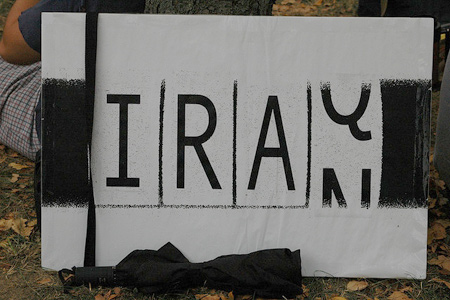In June, the CIA declassified a heavily redacted 2006 review of the intelligence failure on Iraq’s WMD in the lead up to the Bush administration’s 2003 invasion. Thomas Blanton, director of the National Security Archive, writing in Foreign Policy describes it as a mea culpa:
This remarkable CIA mea culpa, just declassified this summer and published here for the first time, describes the U.S. intelligence failure on Iraq’s non-existent weapons of mass destruction as the consequence of “analytic liabilities” and predispositions that kept analysts from seeing the issue “through an Iraqi prism.”
 In reality, the document is much less remarkable when you consider how little a role the intelligence community’s findings played in the decision to invade Iraq. Much is made of the National Intelligence Estimate on Iraq’s WMD and how wrong it was, but as Paul Pillar – who was head of the CIA’s Mid East division during the march to war – has written, “the campaign to sell the war [emphasis in original] moved into high gear before the estimate was ever written.” And there is little in the document that speaks to the pressure the Bush administration heaped on the intelligence community to generate findings that would help justify the war, as opposed to ones that would get closer to the truth. Pillar also writes, “The interaction between Bush administration policymakers and the intelligence community about Iraqi weapons programs was entirely one of the administration’s pressing the community for juicier tidbits that would make more of an impression on the public when talking about Iraqi weapons programs.”
In reality, the document is much less remarkable when you consider how little a role the intelligence community’s findings played in the decision to invade Iraq. Much is made of the National Intelligence Estimate on Iraq’s WMD and how wrong it was, but as Paul Pillar – who was head of the CIA’s Mid East division during the march to war – has written, “the campaign to sell the war [emphasis in original] moved into high gear before the estimate was ever written.” And there is little in the document that speaks to the pressure the Bush administration heaped on the intelligence community to generate findings that would help justify the war, as opposed to ones that would get closer to the truth. Pillar also writes, “The interaction between Bush administration policymakers and the intelligence community about Iraqi weapons programs was entirely one of the administration’s pressing the community for juicier tidbits that would make more of an impression on the public when talking about Iraqi weapons programs.”
As Blanton notes, though, the document does acknowledge confirmation bias: “Analysts tended to focus on what was most important to us — the hunt for WMD — and less on what would be most important for a paranoid dictatorship to protect. Viewed through an Iraqi prism, their reputation, their security, their overall technological capabilities, and their status needed to be preserved.” This is a reminder of how analogous the case of Iraq is to Iran right now. The case for war against Iran rests on a number of falsehoods, all of which flow from an inability to recognize the Iranian government’s central aim of self-preservation – that is, “their reputation, their security, their overall technological capabilities, and their status,” none of which they seem willing to give up by building nuclear weapons (thereby losing what international support and credibility they have) and adopting an offensive posture (which would immediately invite war and possibly regime change).
Blanton writes that “the CIA took almost six years to release the report,” from the date of the declassification request, and asks, “How many years to learn the lessons?”
